Embracing the spectrum: How autism manifests differently in boys and girls
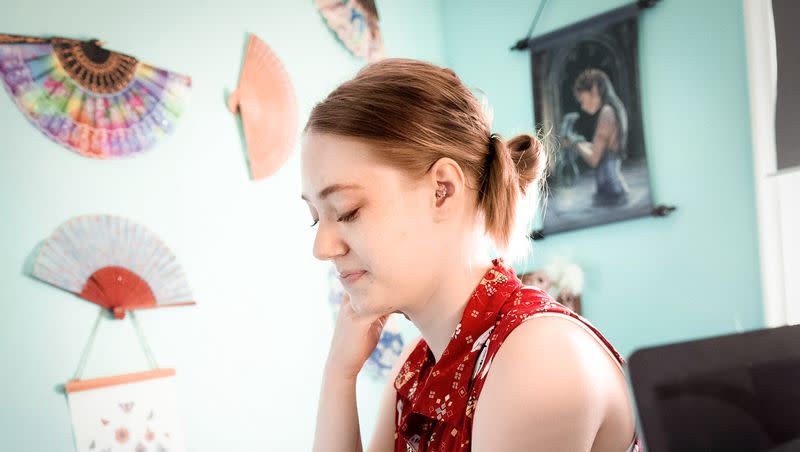
She wore heart-drop lollipop earrings that dangled from her ears, along with little diamond studs complementing the bright red hearts.
Our conversation felt like a normal chat between two girls. She made direct eye contact and didn’t fidget. We talked about the daily struggles of work, about movies and TV shows and even laughed a little at our shared opinion that dating is scary.
“I’m not aware of people flirting with me or checking me out at all,” said Cassie McIff, 20, of Orem, Utah, explaining how starting romantic relationships is more difficult for girls like her because picking up on social cues does not come naturally.
“It’s so much work and effort,” she added.
Cassie has autism. She joked about the struggle of going through adolescence with autism in a way that made her seem brave. She said she’s come a long way — no longer hiding who she is because of other people’s perceptions of autism.
Cassie performs better when listening to music. It allows her brain to focus, helping her to excel in whatever task she tries to accomplish.
While in cosmetology school, the commotion of hair dryers and chatty clients made it difficult for her to focus and do her best on her assignments.
The hair school had a strict no-headphone policy.
Her mom, Martha McIff, had taught her she needs to advocate for herself. But when she explained she needed special accommodations, her hair school wasn’t willing to give her any, even after she explained she has autism.
“It ended up being where I was hiding an earbud in my ear because it was like, I need this. And there’s no reason for me not to make my performance better. I need to do this. So this is what I’m going to do,” Cassie told the Deseret News.
It’s hard enough having to approach a superior for help as a neurotypical individual — someone who does not have autism or other neuro divergencies — but Cassie said having a legitimate request due to how her brain functions and being shut down for it felt nonnegotiable.
“That definitely really tested my ability to advocate for myself just because trying to advocate for myself was hard enough in and of itself, and then having to try and get these people to understand, like, ‘Hey, this isn’t something I can negotiate,’” she said.
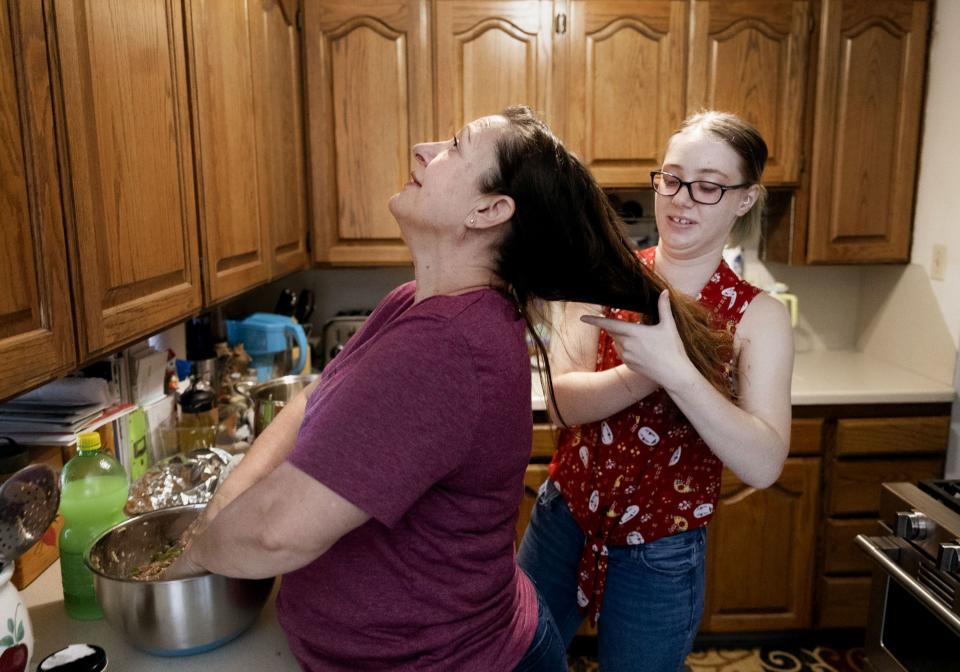
Parenting autism
Martha McIff raised her children on the principle that “you have a disability, not an excuse.”
Cassie’s older sibling, who was born female but identifies now as male, was diagnosed with autism at age 8. Cassie was only diagnosed that early because “my older brother was the guinea pig,” she joked.
At age 3, Martha could tell Cassie had similar behaviors and began getting her the support she needed so she could be appropriately diagnosed with autism, but doctors initially diagnosed her with “personality disorder not otherwise specified.”
They didn’t diagnose Cassie with autism until she was 5, although it was suspected.
Martha believes that was because doctors didn’t want to misdiagnose her and because “It was so so so new back then. We’re talking 16 years ago, and they just didn’t want to do it, even though they knew. We were even in a study at the University of Utah because our family was so interesting” in the sense that they had two autistic daughters, “but they still wouldn’t diagnose her until she was 5.”
She enrolled her children at Spectrum Academy, a charter school in Utah for children with autism or other neurodiversity. Both of her children have since graduated, while Martha continues to work at the elementary school as an office manager.
Related
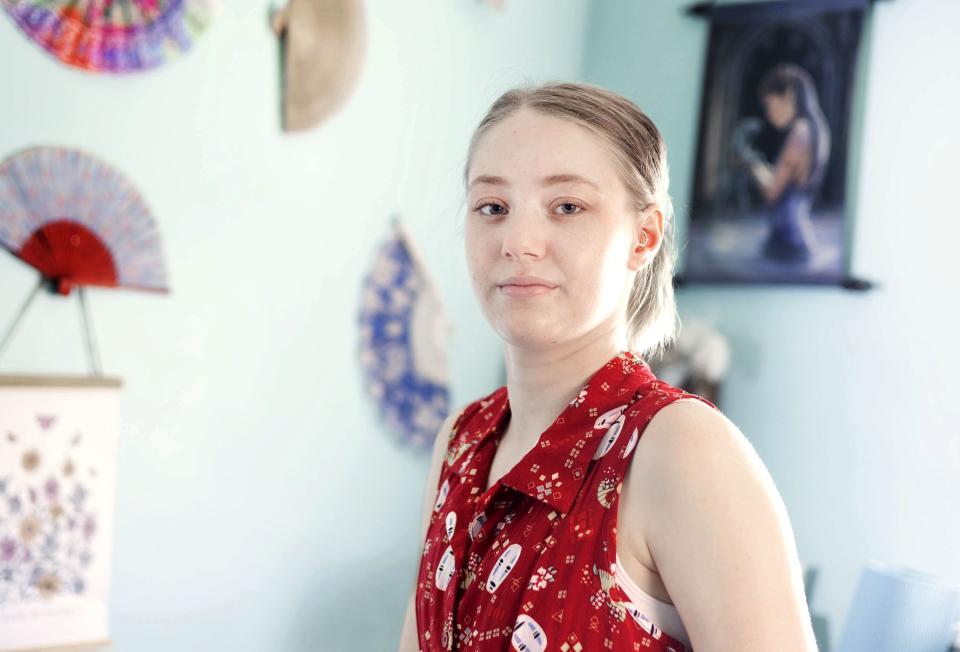
Boys vs. girls
According to Scientific American, “Autism didn’t make its debut in the (Diagnostic and Statistical Manual of Mental Disorders) until 1980.” And even then, the blueprints and studies for children with autism meant to help with diagnosis were catered toward males, making female diagnoses a rarity.
There is no blood test or brain scan to diagnose autism. Instead, doctors study the behaviors and the developmental history of a child to determine a diagnosis.
According to PsychCentral, autism can present differently in boys and girls, causing girls to be diagnosed later in life and boys to be diagnosed more often than girls.
“The differences in signs and symptoms between males and females are subtle and can often go undetected by common screen tests. This can lead to the underdiagnosis of girls with lower support needs, which can impact their mental health and overall well-being,” according to PsychCentral.
The most recent study done by the Centers For Disease Control and Prevention found that 4.66% of boys are diagnosed with autism spectrum disorder, while 1.5% of girls receive the diagnosis, making boys three times as likely to be diagnosed.
In a TED Talk on how autism is often missed in women and girls, Kate Kahle, who was diagnosed as a freshman in high school, shared that “males who outwardly display mild symptoms of autism are diagnosed on average two years earlier than women who display similar symptoms. This might be because female special interests are generally more socially accepted than male special interests.”
“Special interests” refers to the fact that many people with autism develop an intense liking or obsessive behavior toward something at a very young age.
“Autistic people often report that the pursuit of such interests is fundamental to their well-being and happiness, and many channel their interest into studying, paid work, volunteering or other meaningful occupations,” according to the National Autistic Society.
Kahle said that it is common to associate the fascination with trains with boys who have autism, whereas for Kahle, it was all things insects. But because she was a girl, her special interest didn’t stir concern.
According to a BBC article on the gender biases that shape our brains, “Parents of boys often talk about how they are more boisterous and enjoy rougher play, while girls are more gentle and meek.”
Girls and boys with autism play differently, psychologist Thomas Frazier of the Cleveland Clinic told Scientific American.
Special interests in girls, whether Barbie or bugs, tend not to be a cause for concern and are less obvious than boys’ interests when it comes down to diagnosis.
“Girls with autism frequently do not have the same kinds of interests as stereotypical autistic boys. Instead, their pastimes and preferences are more similar to those of other girls,” per Scientific American.
“While my special interests — bugs — were an autistic trait that was largely ignored, my other autistic traits were hidden because I was skilled at masking them,” Kahle added.
To “mask” means hiding or suppressing parts of your personality and mimicking social cues so that you fit in better with society. Everyone deals with the pressure of wanting to fit in, but for children with autism, it is much more challenging.
Statistically, girls are known to be better at masking, which also complicated diagnosis.
For individuals with autism, “masking” or “camouflaging” is “often much more ingrained and harmful to well-being and health. Because our social norms are different to others around us, we often experience greater pressure to hide our true selves and to fit into that non-autistic culture. More often than not, we have to spend our entire lives hiding our traits and trying to fit in, even though the odds of appearing ‘non-autistic’ are against us,” the National Autistic Society explains.
Cassie spent her entire childhood perfecting acting neurotypical, something she says many of her male classmates didn’t worry about.
“I don’t even know how to explain all of it. Everything that I did, I always thought: Am I dressing weird? Am I talking about this too much? How am I presenting myself? Whereas for many boys, it’s like, they wear the same three pairs of pants. So many wore pajamas every day. Or a kid would live in one hat or never shower. And I’m worried that I’m wearing too much jewelry,” she said.
Cassie reflected on a time when a girl who transferred to the academy in high school was diagnosed much later because she was so good at maintaining eye contact. Difficulty keeping eye contact is a common trait for people with autism, but she had learned to mask so well that it was harder for doctors to diagnose.
In ninth grade, it hit Cassie that living so long under a mask, “Oh, I don’t have a personality. I am my mask. There is nothing else.”
She spent high school trying to discover her personality and trying not to suppress who she was to seem like everyone else.
“I’m still definitely figuring it out, but I’m definitely more comfortable with me being autistic now than I was back then. It was definitely a lot worse as far as me masking because it was like, I didn’t want to be perceived as that one kid.”
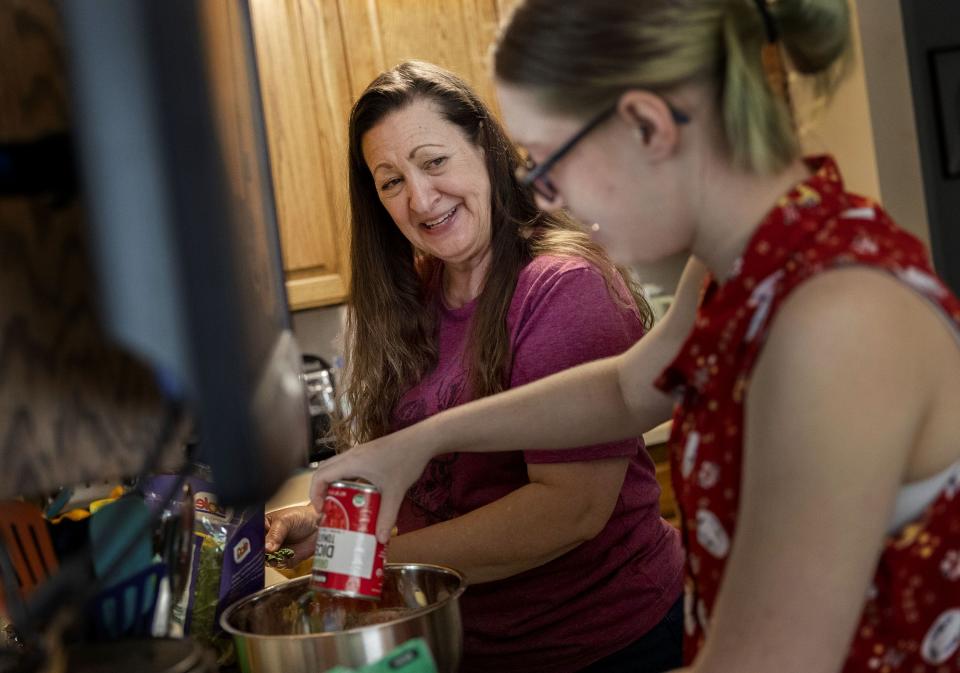
Unique gifts
As a mother to two autistic children and an office manager at Spectrum Academy, Martha has advocated for children on the autism spectrum to view their differences as gifts.
She said it’s hard at the beginning of your child’s diagnosis, but you can’t be afraid to ask for help. You have to do the research and put the hours in because “you can’t just figure it out,” Martha told the Deseret News.
She stressed that she had to learn the differences between neurodivergence vs. neurotypical behaviors so that she could teach her children how to talk and understand neurotypical ways of thought.
“And it’s not that I want her neurotypical, I love her autism. That’s all the fun parts in her, too, but like it or not — and this is what I don’t think people get — they are going to have to go into that big bad world. And if you don’t give them the tools and help, then they won’t know what to do,” Martha said.
Related
Career paths
Cassie was taught to work around the issues brought on by her autism rather than allow them to handicap her.
Martha said parents get it wrong when they treat their child’s autism as a disability: “And that’s why I always say, this is Cassie, and she has autism. She isn’t autism.”
She added that at the academy, she will often have children tell her they can’t do something because they have autism, to which she’ll reply, “And?”
Now that she has gone through trade school and works in a job where many people aren’t even aware of her autism, Cassie stresses that those skills in advocating for herself growing up have been pivotal for her as an adult.
“When you go into the real world, it’s really hard to get any little bit of accommodation I still need. It’s hard to get, but for these kids that haven’t been trained or haven’t experienced trying to work around their issues, it’s a lot harder,” she said. “There are very few issues that I still have, but when I have them, it’s like, OK, this is one of the few things that need to be accommodated on.”
For an autistic person, looking for a job can be daunting and stressful when specific accommodations need to be met to perform at one’s best.
Aysha Rigby used to work as an employment manager for Atlas Advocacy Services, helping individuals with disabilities integrate into their community and find fulfilling jobs.
Rigby told the Deseret News that one of the biggest challenges she faced was explaining to her clients that just because they may need special services does not mean they have to settle on employment opportunities.
“With all of my clients, the industry that they excel in is the one that they are interested in and that they enjoy every single time … there’s a big issue with just placing individuals who have a disability into a job with the lowest expectations,” she said.
Rigby believes that basic respect and communication can solve almost any problem.
While sitting down with her clients and discussing what their dream careers look like, she said more often than not, they settle for what they think is their only option.
“I would ask my clients, ‘What do you want to do? What’s your dream job? What are you interested in?’ And most of the time, they would just shrug their shoulders and say, ‘I don’t know, fast food, or I don’t know, janitor.’ Rarely, I mean, maybe there are a few people who have those goals in life, but for the majority of my clients, that’s not really their goals or aspirations in life. It’s just all they’ve ever been told they can do.”
She stressed that this is an all-too-common problem. “You see this pattern over and over and over again, where people with disabilities get put into the same lowest-paying, lowest-expectation jobs because of bias and societal patterns that we’ve gotten into of just shoving them into the easiest job we can find. But the more time that I spent with each of my clients, I would find out that they have so many interests and talents they could excel in.”
Rigby said that her highest success rate was when her clients found jobs they had an interest in and that they always enjoyed.
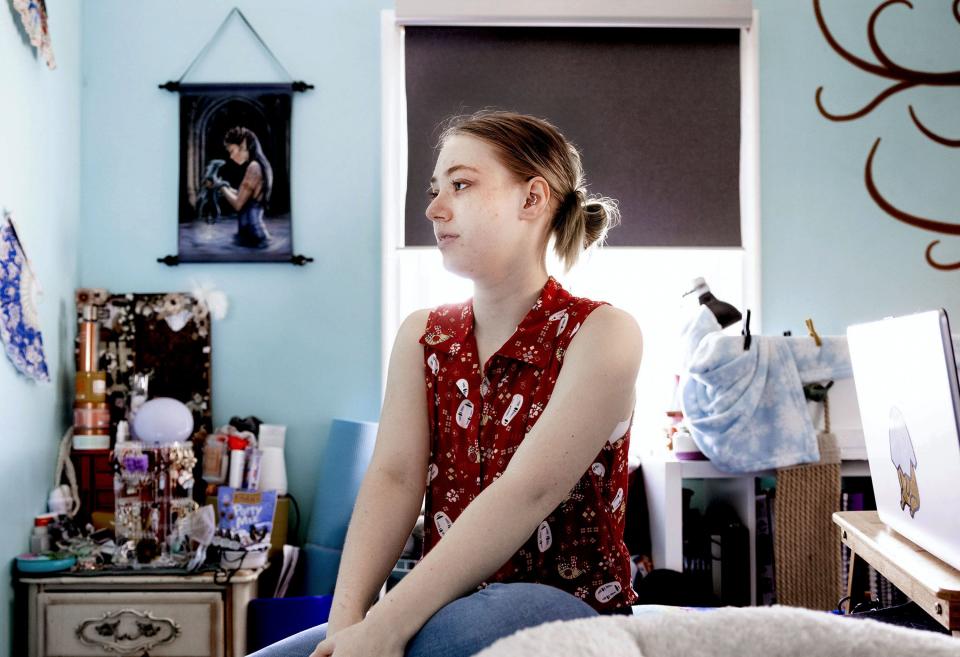
Awareness
Mental health awareness has made great strides.
Social media has been a huge outlet for many discussions on the similarities and differences humans experience.
TikTok has become a place where exposure to a variety of mental health concepts has caused many people to find meaning behind their feelings and, in a sense, diagnose themselves, according to Overcomers Counseling.
The counseling group said that they have seen a large increase in the self-diagnosis of autism spectrum disorder due to social media. “The biggest and most common thread I have seen in these folks, however, is that the diagnosis provides a sense of closure or comfort for things they have struggled with, whether pertaining to (autism spectrum disorder) or just some of the more common things a lot of folks struggle with, especially young adults.”
Cassie said she thinks self-diagnosis is amazing — especially for women — as long as they follow up with professional help.
“That’s definitely the next step,” she said, “But I think that first, you have to go in armed with the knowledge of ‘OK, I have all these symptoms. This is what I need to ask for. I think I have anxiety, so this is what I need to get tested for.’ Versus, if someone just goes in and goes ‘there’s something wrong with me,’ they might get ADHD and then bipolar and then finally get diagnosed with autism.”
As an adult, Cassie looks back at her childhood and recalls all the lines in the sand she had to make because her brain didn’t understand what was too far and what wasn’t far enough.
“I still might overstep it every now and then. But usually, I’ll overstep it and go, ‘That was too far,’” she said.
Understanding and accepting neurodiversity and all its gifts is how a culture of acceptance and support is fostered, Cassie and experts told the Deseret News.
Cassie understands that what makes her brain different is what makes her unique and that it is never going to change:
“My brain works differently, and it’s not going to get cured. It’s not going to get fixed. It’s just how it is.”